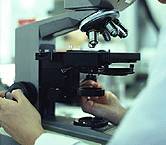
WEDNESDAY, May 5 (HealthDay News) — People who are resistant to HIV, the virus that causes AIDS, have a gene that gives them a stronger immune system, a new study shows.
A small number of people exposed to HIV — about one in every 200 infected — develop AIDS very slowly or never develop the disease. Previous research found that a large number of these naturally HIV-immune people have a gene called HLA B57.
In this new study, U.S. researchers found that HLA B57 causes the body to produce more powerful killer T cells, which are white blood cells that attack infectious invaders. People with HLA B57 have a larger number of T cells that bind strongly to more pieces of HIV protein than people who don’t have the gene. In people with HLA B57, T cells are more likely to recognize cells that express HIV proteins, including mutated versions that arise during infection.
The findings may help scientists develop vaccines that trigger the same immune response to HIV that occurs naturally in people with HLA B57, according to the researchers from the Ragon Institute of Massachusetts General Hospital, MIT and Harvard.
The study was published online May 5 in the journal Nature.
More information
The U.S. Centers for Disease Control and Prevention has more about HIV and AIDS.

